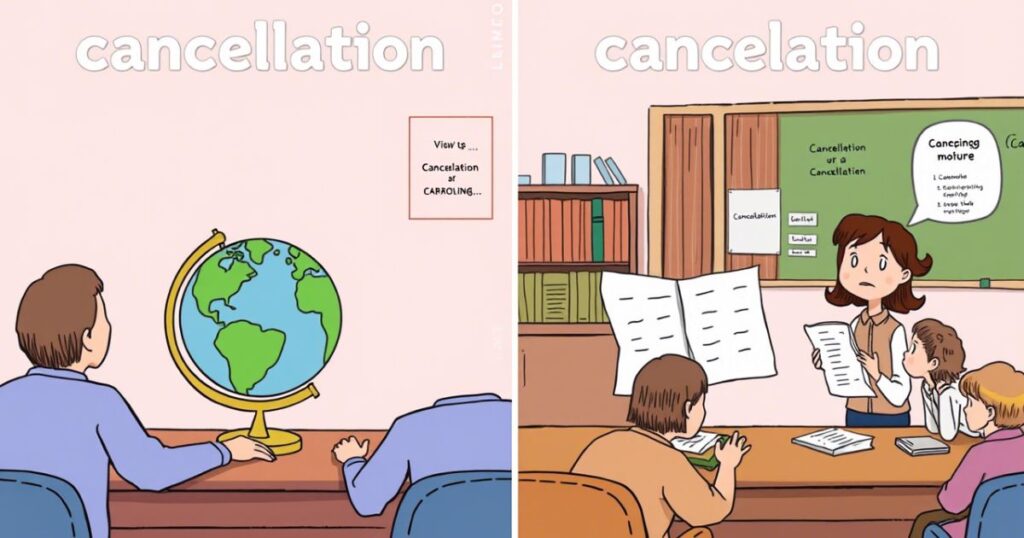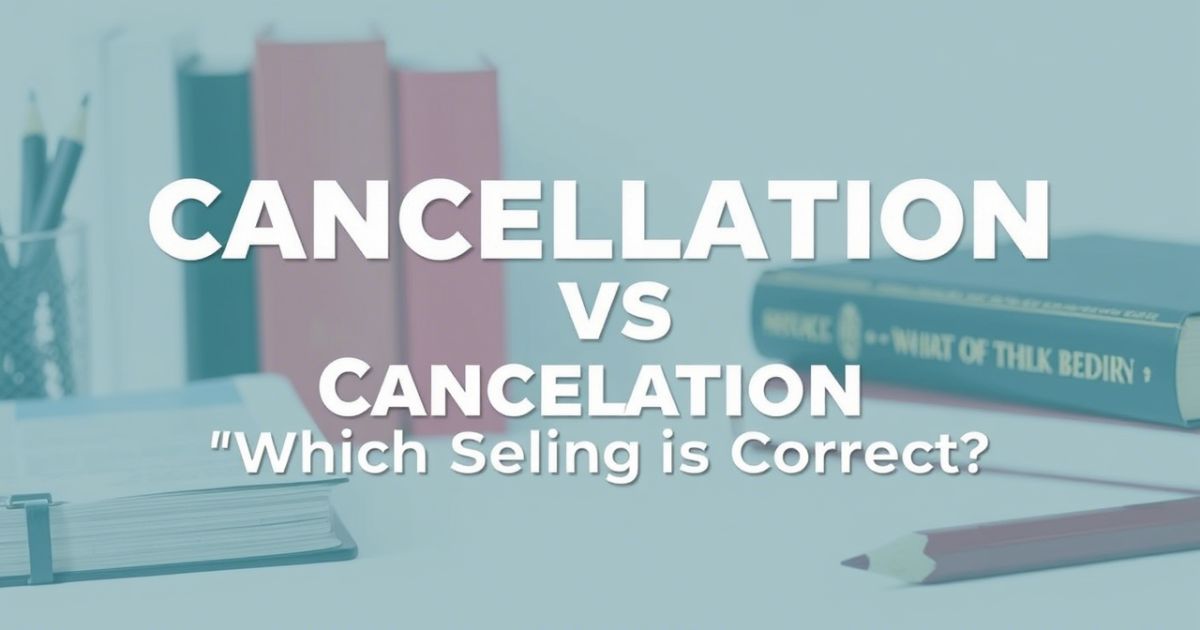Cancellation vs Cancelation is a common question. Many people are confused about the right spelling. Should you use cancellation or cancelation? Or is it cancelation or cancellation? Both forms appear often, but they are not used the same way. Knowing when to use cancelation helps you write clearly. In this guide, we will explain everything about cancellation vs cancelation.
You might see both words in emails, notices, or contracts. Some people prefer cancelation, while others stick to cancellation. So, which is correct? The truth is, both can be right depending on where you are. This article will help you understand cancelation vs cancellation and choose the right word. Keep reading to learn why cancellation vs cancelation matters more than you think.
Why is There Confusion?
There is a lot of confusion about cancellation vs cancelation because both forms show up in everyday writing. People see cancellation or cancelation in emails, travel documents, news articles, and even official notices. Sometimes the double “l” looks more correct, and other times the single “l” appears normal, depending on where you are. This can make even native English speakers second-guess themselves.
The confusion grows because American and British English don’t always follow the same spelling rules. In the case of cancelation vs cancellation, small spelling changes make a big difference. Some think one version is wrong, but that’s not true. Both are accepted, just preferred differently depending on the style of English being used. Understanding this small but important detail can help you sound more professional and confident in your writing.
What Do Cancellation and Cancelation Mean?

Both cancellation and cancelation mean the ending of something that was planned. It could be a trip, a meeting, a subscription, or even a service. You might hear phrases like cancellation of event or cancellation of flight. Whether you use one “l” or two, the meaning stays exactly the same something that was going to happen will no longer take place.
In daily life, you might also deal with things like a cancellation refund or a cancellation policy when plans change. Whether you spell it cancelation or cancellation, the focus is still on calling off, invalidating, or terminating something. Knowing the meaning helps you use both words confidently, especially when dealing with contracts, tickets, and services where precise wording matters.
Cancellation vs Cancelation: Which Spelling Should You Use?
Choosing between cancellation vs cancelation mainly depends on your audience. If you are writing for an American business, newspaper, or website, you should use the single “l” spelling — cancelation. However, if you are writing for an international or British audience, cancellation with double “l” is more expected and looks more natural.
It’s smart to match the spelling style to your reader. Using the correct version of cancelation or cancellation shows attention to detail and respect for regional language rules. Some style guides like AP (American) prefer cancelation, while others like Oxford (British) stick with cancellation. Always double-check your audience or client requirements when in doubt.
Related Guide:
Excel or Accel: What is the correct Spelling?
Why Do American and British English Differ in the Use of Single or Double L?
The difference in cancellation vs cancelation comes from language reform led by Noah Webster in the 1800s. He believed that American English should be simpler and break away from old British spelling rules. That’s why Americans dropped extra letters, like the second “l” in cancelation, to make words faster and easier to spell.
British English, however, kept many traditional spellings, including the double “l” spelling. That’s why words like travelling, modelling, and fuelling still have double letters in the UK. So when thinking about cancelation vs cancellation, remember that American English often cuts letters to simplify, while British English preserves older forms. Both styles are correct within their own systems.
| American English | British English |
| cancelation | cancellation |
| canceled | cancelled |
| canceling | cancelling |
| traveler | traveller |
| traveled | travelled |
| traveling | travelling |
| modeled | modelled |
| modeling | modelling |
| marveled | marvelled |
| marveling | marvelling |
| fueled | fuelled |
| fueling | fuelling |
| labeled | labelled |
| labeling | labelling |
| signaled | signalled |
| signaling | signalling |
| dialed | dialled |
| dialing | dialling |
| quarreled | quarrelled |
| quarreling | quarrelling |
Synonyms of “Cancellation”

Cancellation refers to the act of calling something off or terminating a planned event or agreement. There are many other words that carry a similar meaning, depending on the context.
- Annulment : often used in legal contexts, referring to the act of declaring something invalid or void.
- Revocation : the formal cancellation or withdrawal of something, often a decision or agreement.
- Termination : the act of ending something, like a contract or service, before it’s completed.
- Abandonment : the act of leaving something behind, often referring to projects or plans that are no longer pursued.
- Rescission : a legal term for canceling or undoing a contract or agreement.
- Invalidation : the process of making something legally or officially void or ineffective.
- Calling off : informally used when an event, meeting, or plan is canceled at the last moment.
- Withdrawal : the act of removing oneself from a situation or canceling participation in something.
- Dissolution : the formal ending of an organization, partnership, or agreement.
- Discontinuation : the stopping or ending of something, such as a service, product, or activity.
- Repeal : the action of formally revoking or annulling a law or regulation.
- Disbandment : often used when a group or organization is formally ended or dissolved.
- Nullification : the legal process of making something invalid, often used with laws or agreements.
- Reversal : the action of changing a previous decision or event, often canceling it out.
- Cease : the act of stopping something, often used in the context of an ongoing action or process.
Examples in Context
Each sentence uses the synonym in a real-world context, reflecting the idea of cancellation or termination, but with slightly different nuances based on the synonym used.
- Annulment : The annulment of their marriage was finalized after years of legal battles.
- Revocation : The revocation of his access to the system was due to a security breach.
- Termination : The termination of the contract was announced after the project fell behind schedule.
- Abandonment : The abandonment of the project led to a complete shutdown of the operations.
- Rescission : The rescission of the agreement was agreed upon after both parties failed to meet the terms.
- Invalidation : The invalidation of the claim left the company with no legal standing in the dispute.
- Calling off : The calling off of the outdoor event was due to unforeseen weather conditions.
- Withdrawal : The withdrawal of the proposal came after negative feedback from key stakeholders.
- Dissolution : The dissolution of the partnership marked the end of the long-running business venture.
- Discontinuation : The discontinuation of the product line shocked loyal customers who relied on it for years.
- Repeal : The repeal of the outdated law brought relief to many local businesses.
- Disbandment : The disbandment of the team left the players searching for new opportunities.
- Nullification : The nullification of the contract meant all prior agreements were void.
- Reversal : The reversal of the previous decision allowed the project to continue without delays.
- Cease : The cease of operations came suddenly after safety issues were flagged during inspection.
Origins of “Cancellation”

The word “cancellation” has its roots in Latin, derived from the word “cancellare”, which means “to cross out” or “to make something invalid.” The word itself comes from “cancellus”, meaning a lattice or a grid, symbolizing the action of crossing out or blocking something. In ancient times, crossing out text or markings on documents was a way to invalidate or revoke their authenticity, laying the foundation for how we use the term today.
Over time, the term “cancellation” evolved, taking on broader meanings. It was first used in the context of legal and official documents, where actions or agreements were formally nullified or called off. By the 16th century, it appeared in English usage, and its meaning expanded beyond legal documents to describe any act of calling off plans, events, or agreements. This adaptation of the word became central in everyday language, especially with modern technology and travel-related services where cancellations are commonplace.
FAQ’s
What is Cancellation vs Cancelation?
Cancellation vs Cancelation is about two ways to spell the same word. One is more common in American English, the other in British English.
Why do people confuse Cancellation vs Cancelation?
People confuse Cancellation vs Cancelation because both forms are used. American English often prefers cancelation, while British English sticks with cancellation.
Which spelling is correct in Cancellation vs Cancelation?
In Cancellation vs Cancelation, both spellings are correct. However, cancellation with double “l” is more common in formal writing and British English.
Is Cancellation vs Cancelation important for contracts?
Yes, Cancellation vs Cancelation is important in contracts. Using the correct spelling can show professionalism and avoid confusion in legal or business documents.
How can I remember the difference in Cancellation vs Cancelation?
To remember Cancellation vs Cancelation, think of American English liking simpler forms. British English often keeps the extra “l” in words like cancellation.
Conclusion
Understanding cancellation vs cancelation is important for clear writing. Some people use cancellation or cancelation without knowing the difference. Others ask if it is cancelation or cancellation. In truth, both are correct, but you must know your audience. Cancelation is more common in American English. Cancellation is used more in British English. When you write emails, contracts, or travel notices, you should pick the right spelling. This avoids confusion and looks professional.
Learning about cancelation vs cancellation helps you in daily life. Whether you face a cancellation or cancelation of a flight, event, or meeting, the words matter. Always check if you need cancelation or cancellation based on where you are. Some companies use cancelation in policies, while others prefer cancellation. Now you know how to choose between cancellation vs cancelation easily. Keep these tips in mind, and you will always get it right.

Ember Rose is a dedicated administrator with 4 years of experience in efficient operations management and team leadership. Skilled in streamlining workflows and enhancing productivity.

